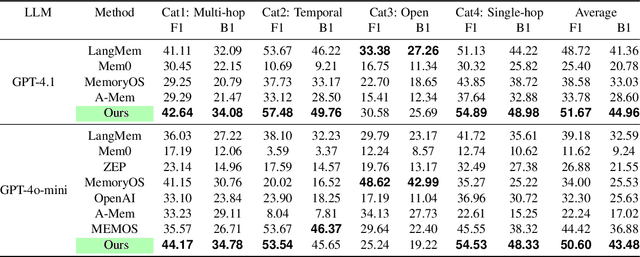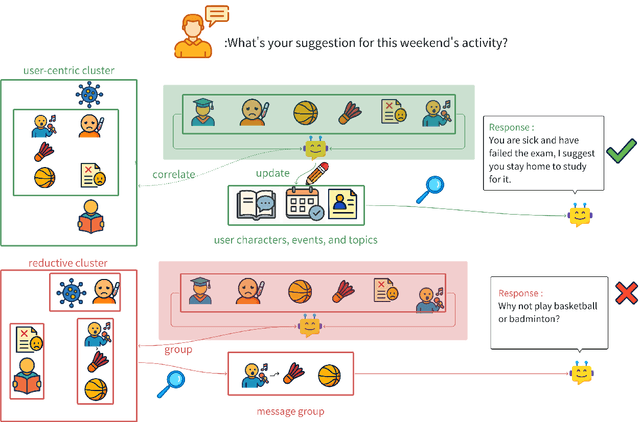Wangchunshu Zhou
Reliable and Responsible Foundation Models: A Comprehensive Survey
Feb 04, 2026Abstract:Foundation models, including Large Language Models (LLMs), Multimodal Large Language Models (MLLMs), Image Generative Models (i.e, Text-to-Image Models and Image-Editing Models), and Video Generative Models, have become essential tools with broad applications across various domains such as law, medicine, education, finance, science, and beyond. As these models see increasing real-world deployment, ensuring their reliability and responsibility has become critical for academia, industry, and government. This survey addresses the reliable and responsible development of foundation models. We explore critical issues, including bias and fairness, security and privacy, uncertainty, explainability, and distribution shift. Our research also covers model limitations, such as hallucinations, as well as methods like alignment and Artificial Intelligence-Generated Content (AIGC) detection. For each area, we review the current state of the field and outline concrete future research directions. Additionally, we discuss the intersections between these areas, highlighting their connections and shared challenges. We hope our survey fosters the development of foundation models that are not only powerful but also ethical, trustworthy, reliable, and socially responsible.
HiNS: Hierarchical Negative Sampling for More Comprehensive Memory Retrieval Embedding Model
Jan 21, 2026Abstract:Memory-augmented language agents rely on embedding models for effective memory retrieval. However, existing training data construction overlooks a critical limitation: the hierarchical difficulty of negative samples and their natural distribution in human-agent interactions. In practice, some negatives are semantically close distractors while others are trivially irrelevant, and natural dialogue exhibits structured proportions of these types. Current approaches using synthetic or uniformly sampled negatives fail to reflect this diversity, limiting embedding models' ability to learn nuanced discrimination essential for robust memory retrieval. In this work, we propose a principled data construction framework HiNS that explicitly models negative sample difficulty tiers and incorporates empirically grounded negative ratios derived from conversational data, enabling the training of embedding models with substantially improved retrieval fidelity and generalization in memory-intensive tasks. Experiments show significant improvements: on LoCoMo, F1/BLEU-1 gains of 3.27%/3.30%(MemoryOS) and 1.95%/1.78% (Mem0); on PERSONAMEM, total score improvements of 1.19% (MemoryOS) and 2.55% (Mem0).
PersonaDual: Balancing Personalization and Objectivity via Adaptive Reasoning
Jan 13, 2026Abstract:As users increasingly expect LLMs to align with their preferences, personalized information becomes valuable. However, personalized information can be a double-edged sword: it can improve interaction but may compromise objectivity and factual correctness, especially when it is misaligned with the question. To alleviate this problem, we propose PersonaDual, a framework that supports both general-purpose objective reasoning and personalized reasoning in a single model, and adaptively switches modes based on context. PersonaDual is first trained with SFT to learn two reasoning patterns, and then further optimized via reinforcement learning with our proposed DualGRPO to improve mode selection. Experiments on objective and personalized benchmarks show that PersonaDual preserves the benefits of personalization while reducing interference, achieving near interference-free performance and better leveraging helpful personalized signals to improve objective problem-solving.
O-Researcher: An Open Ended Deep Research Model via Multi-Agent Distillation and Agentic RL
Jan 07, 2026Abstract:The performance gap between closed-source and open-source large language models (LLMs) is largely attributed to disparities in access to high-quality training data. To bridge this gap, we introduce a novel framework for the automated synthesis of sophisticated, research-grade instructional data. Our approach centers on a multi-agent workflow where collaborative AI agents simulate complex tool-integrated reasoning to generate diverse and high-fidelity data end-to-end. Leveraging this synthesized data, we develop a two-stage training strategy that integrates supervised fine-tuning with a novel reinforcement learning method, designed to maximize model alignment and capability. Extensive experiments demonstrate that our framework empowers open-source models across multiple scales, enabling them to achieve new state-of-the-art performance on the major deep research benchmark. This work provides a scalable and effective pathway for advancing open-source LLMs without relying on proprietary data or models.
MemEvolve: Meta-Evolution of Agent Memory Systems
Dec 21, 2025Abstract:Self-evolving memory systems are unprecedentedly reshaping the evolutionary paradigm of large language model (LLM)-based agents. Prior work has predominantly relied on manually engineered memory architectures to store trajectories, distill experience, and synthesize reusable tools, enabling agents to evolve on the fly within environment interactions. However, this paradigm is fundamentally constrained by the staticity of the memory system itself: while memory facilitates agent-level evolving, the underlying memory architecture cannot be meta-adapted to diverse task contexts. To address this gap, we propose MemEvolve, a meta-evolutionary framework that jointly evolves agents' experiential knowledge and their memory architecture, allowing agent systems not only to accumulate experience but also to progressively refine how they learn from it. To ground MemEvolve in prior research and foster openness in future self-evolving systems, we introduce EvolveLab, a unified self-evolving memory codebase that distills twelve representative memory systems into a modular design space (encode, store, retrieve, manage), providing both a standardized implementation substrate and a fair experimental arena. Extensive evaluations on four challenging agentic benchmarks demonstrate that MemEvolve achieves (I) substantial performance gains, improving frameworks such as SmolAgent and Flash-Searcher by up to $17.06\%$; and (II) strong cross-task and cross-LLM generalization, designing memory architectures that transfer effectively across diverse benchmarks and backbone models.
Memory in the Age of AI Agents
Dec 15, 2025Abstract:Memory has emerged, and will continue to remain, a core capability of foundation model-based agents. As research on agent memory rapidly expands and attracts unprecedented attention, the field has also become increasingly fragmented. Existing works that fall under the umbrella of agent memory often differ substantially in their motivations, implementations, and evaluation protocols, while the proliferation of loosely defined memory terminologies has further obscured conceptual clarity. Traditional taxonomies such as long/short-term memory have proven insufficient to capture the diversity of contemporary agent memory systems. This work aims to provide an up-to-date landscape of current agent memory research. We begin by clearly delineating the scope of agent memory and distinguishing it from related concepts such as LLM memory, retrieval augmented generation (RAG), and context engineering. We then examine agent memory through the unified lenses of forms, functions, and dynamics. From the perspective of forms, we identify three dominant realizations of agent memory, namely token-level, parametric, and latent memory. From the perspective of functions, we propose a finer-grained taxonomy that distinguishes factual, experiential, and working memory. From the perspective of dynamics, we analyze how memory is formed, evolved, and retrieved over time. To support practical development, we compile a comprehensive summary of memory benchmarks and open-source frameworks. Beyond consolidation, we articulate a forward-looking perspective on emerging research frontiers, including memory automation, reinforcement learning integration, multimodal memory, multi-agent memory, and trustworthiness issues. We hope this survey serves not only as a reference for existing work, but also as a conceptual foundation for rethinking memory as a first-class primitive in the design of future agentic intelligence.
O-Mem: Omni Memory System for Personalized, Long Horizon, Self-Evolving Agents
Nov 18, 2025



Abstract:Recent advancements in LLM-powered agents have demonstrated significant potential in generating human-like responses; however, they continue to face challenges in maintaining long-term interactions within complex environments, primarily due to limitations in contextual consistency and dynamic personalization. Existing memory systems often depend on semantic grouping prior to retrieval, which can overlook semantically irrelevant yet critical user information and introduce retrieval noise. In this report, we propose the initial design of O-Mem, a novel memory framework based on active user profiling that dynamically extracts and updates user characteristics and event records from their proactive interactions with agents. O-Mem supports hierarchical retrieval of persona attributes and topic-related context, enabling more adaptive and coherent personalized responses. O-Mem achieves 51.67% on the public LoCoMo benchmark, a nearly 3% improvement upon LangMem,the previous state-of-the-art, and it achieves 62.99% on PERSONAMEM, a 3.5% improvement upon A-Mem,the previous state-of-the-art. O-Mem also boosts token and interaction response time efficiency compared to previous memory frameworks. Our work opens up promising directions for developing efficient and human-like personalized AI assistants in the future.
Towards Faithful and Controllable Personalization via Critique-Post-Edit Reinforcement Learning
Oct 21, 2025Abstract:Faithfully personalizing large language models (LLMs) to align with individual user preferences is a critical but challenging task. While supervised fine-tuning (SFT) quickly reaches a performance plateau, standard reinforcement learning from human feedback (RLHF) also struggles with the nuances of personalization. Scalar-based reward models are prone to reward hacking which leads to verbose and superficially personalized responses. To address these limitations, we propose Critique-Post-Edit, a robust reinforcement learning framework that enables more faithful and controllable personalization. Our framework integrates two key components: (1) a Personalized Generative Reward Model (GRM) that provides multi-dimensional scores and textual critiques to resist reward hacking, and (2) a Critique-Post-Edit mechanism where the policy model revises its own outputs based on these critiques for more targeted and efficient learning. Under a rigorous length-controlled evaluation, our method substantially outperforms standard PPO on personalization benchmarks. Personalized Qwen2.5-7B achieves an average 11\% win-rate improvement, and personalized Qwen2.5-14B model surpasses the performance of GPT-4.1. These results demonstrate a practical path to faithful, efficient, and controllable personalization.
AgenTracer: Who Is Inducing Failure in the LLM Agentic Systems?
Sep 04, 2025Abstract:Large Language Model (LLM)-based agentic systems, often comprising multiple models, complex tool invocations, and orchestration protocols, substantially outperform monolithic agents. Yet this very sophistication amplifies their fragility, making them more prone to system failure. Pinpointing the specific agent or step responsible for an error within long execution traces defines the task of agentic system failure attribution. Current state-of-the-art reasoning LLMs, however, remain strikingly inadequate for this challenge, with accuracy generally below 10%. To address this gap, we propose AgenTracer, the first automated framework for annotating failed multi-agent trajectories via counterfactual replay and programmed fault injection, producing the curated dataset TracerTraj. Leveraging this resource, we develop AgenTracer-8B, a lightweight failure tracer trained with multi-granular reinforcement learning, capable of efficiently diagnosing errors in verbose multi-agent interactions. On the Who&When benchmark, AgenTracer-8B outperforms giant proprietary LLMs like Gemini-2.5-Pro and Claude-4-Sonnet by up to 18.18%, setting a new standard in LLM agentic failure attribution. More importantly, AgenTracer-8B delivers actionable feedback to off-the-shelf multi-agent systems like MetaGPT and MaAS with 4.8-14.2% performance gains, empowering self-correcting and self-evolving agentic AI.
TreePO: Bridging the Gap of Policy Optimization and Efficacy and Inference Efficiency with Heuristic Tree-based Modeling
Aug 24, 2025



Abstract:Recent advancements in aligning large language models via reinforcement learning have achieved remarkable gains in solving complex reasoning problems, but at the cost of expensive on-policy rollouts and limited exploration of diverse reasoning paths. In this work, we introduce TreePO, involving a self-guided rollout algorithm that views sequence generation as a tree-structured searching process. Composed of dynamic tree sampling policy and fixed-length segment decoding, TreePO leverages local uncertainty to warrant additional branches. By amortizing computation across common prefixes and pruning low-value paths early, TreePO essentially reduces the per-update compute burden while preserving or enhancing exploration diversity. Key contributions include: (1) a segment-wise sampling algorithm that alleviates the KV cache burden through contiguous segments and spawns new branches along with an early-stop mechanism; (2) a tree-based segment-level advantage estimation that considers both global and local proximal policy optimization. and (3) analysis on the effectiveness of probability and quality-driven dynamic divergence and fallback strategy. We empirically validate the performance gain of TreePO on a set reasoning benchmarks and the efficiency saving of GPU hours from 22\% up to 43\% of the sampling design for the trained models, meanwhile showing up to 40\% reduction at trajectory-level and 35\% at token-level sampling compute for the existing models. While offering a free lunch of inference efficiency, TreePO reveals a practical path toward scaling RL-based post-training with fewer samples and less compute. Home page locates at https://m-a-p.ai/TreePO.
 Add to Chrome
Add to Chrome Add to Firefox
Add to Firefox Add to Edge
Add to Edge